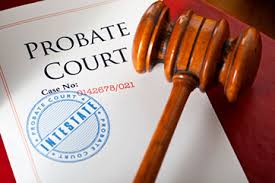Top 10 Questions about Probate and Trust Administrations
Losing a parent or a loved one is difficult no matter where you live, but it is more difficult to deal with probate and trust administration issues if you are living out of state. What are the first things you should do? Who should you call for assistance? How long does this process take? Regardless of whether you are dealing with a Will or a Trust for your loved one within this state or outside of it, below are the top 10 questions that people ask me when I am meeting with them about helping them through this process.
- What do I do first? The most important thing to do right away is to locate the latest version of the Will or the Trust for your loved one. Make sure that it has not been amended or revoked. Preferably, it is best to have the original of the Will or the Trust. A close second is to get a handle on all of the decedent’s assets and liabilities, including the type of asset, how each is titled, whether it has a beneficiary designation, and the date-of-date value for each asset, and the details related to all of the decedent’s debts. Finally, it is important to assemble a team of good professionals to assist you through the process.
- Do I need to live in Arizona to serve as a Personal Representative or a Successor Trustee? No, it is not necessary to live in Arizona to serve as the Personal Representative (i.e., Arizona’s word for Executor) or as the Successor Trustee for an Arizona Will or Trust. I help lots of out-of-state Personal Representatives and Successor Trustees serve in these capacities.
- How long does it take to administer a Will or a Trust? Unless there are tax-related issues associated with larger estates, difficult assets to administer, or difficult beneficiaries, it generally takes between six months and a year to administer most Wills and Trusts in Arizona.
- Am I personally liable for the Estate’s debts? In general, the answer is no. As the Personal Representative or Successor Trustee, you are responsible for paying all just debts of the Estate, but you are not liable personally for the payment of such debts if there are not enough assets in the Estate to pay for all of them. In such instance, there is a process for paying the just debts on a pro rata basis. However, as the Personal Representative or the Successor Trustee, if you make distributions to the beneficiaries first before paying such just debts, then there could be some personal exposure for you. With my guidance, I ensure that this will never be the case for my Personal Representative and Successor Trustee clients.
- What are the key steps in the administration of a Will or a Trust? Please see two blogs that I have written on these topics in the last two years. First, the blog entitled “How Long Does Probate Take?” in March 2017 discusses the basic steps for administering a Will in a probate case. Next, the blog entitled “How Do I Administer a Trust?” in January of 2018 describes the steps in administering a Trust.
- What is my main job as the Personal Representative or Successor Trustee? As the Personal Representative or the Successor Trustee, your main job is to serve as a fiduciary for the Estate. This means first and foremost that you follow the terms of the Will or the Trust. Second, it means that you pay all just debts. Third, it means that you make distributions to the beneficiaries according to the terms of the Will or the Trust. Finally, along the way, you need to keep everyone informed during each step in the process.
- Can a Personal Representative or a Trustee get paid for serving in this role? Yes, a Personal Representative or a Successor Trustee can get paid for serving in this role. However, in my 20+ years of handling these types of matters, 90-95% of the Personal Representatives and Successor Trustees who serve in these roles do not seek payment in order to preserve family harmony. For those instances where clients do wish to seek payment, then I assist them with creating time logs in order to document their time spent on the case. Finally, I tell clients that reimbursement for out-of-pocket expenses is a different situation altogether. Personal Representatives and Successor Trustees can always get reimbursed for their out-of-pocket expenses incurred in the estate administration.
- Who are the key professionals that I need to hire to help me serve in this role? The most important one is a good Arizona probate attorney. However, a good CPA to handle any tax returns and tax-related issues is a close second. Finally, for estates with a house in them, a good realtor is another important professional to have on your team.
- How can I locate a good Arizona probate attorney or CPA? Experience is probably the biggest thing to look for in an Arizona probate attorney or a CPA. Can they handle the estate issues in a cost-effective and timely manner? How long have they been handling these types of matters? Have others had positive experiences with them in other estate matters? If you are here in Arizona, word of mouth referrals are generally good. However, even if you are local, it is good to look online to see what the professional’s online resume looks like and, most importantly, what do other clients say about the professional online.
- What are the pitfalls that I need to avoid? I will mention the top three pitfalls here. First, lack of transparency. The Personal Representative or Successor Trustee has to communicate early and often in the process to let the beneficiaries know what is going on. Second, the Personal Representative or Successor Trustee needs to send out certain notices at the beginning and end of the case that are required by law. Failure to do so is a breach of your fiduciary duty and can lead to other troubles. Finally, not getting the professional help that you need in the process can also get you in trouble. I have assisted several do-it-yourselfers in cleaning up “the mess” after the process got out of control.
Need help? Please call me today – 602.663.9263
 Our firm has helped hundreds of families just like yours handle a wide variety of estate planning, business planning, probate, trust, and elder law issues. When families or business owners are not getting along, we can also handle any disputes and litigation related to their businesses, wills, trusts, guardianships, or conservatorships. Please give me a call, so that I can help you work through these difficult issues with confidence.
Our firm has helped hundreds of families just like yours handle a wide variety of estate planning, business planning, probate, trust, and elder law issues. When families or business owners are not getting along, we can also handle any disputes and litigation related to their businesses, wills, trusts, guardianships, or conservatorships. Please give me a call, so that I can help you work through these difficult issues with confidence.











